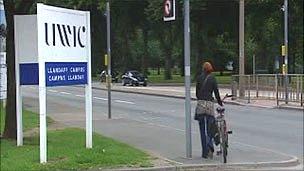Uwic pulls out of south east Wales super-university
- Published

Uwic says it does not want to merge with the University of Wales, Newport and the University of Glamorgan
The University of Wales Institute, Cardiff (Uwic) has said it will not be part of a proposed super-university in south east Wales.
It has decided not to merge with the University of Wales, Newport and the University of Glamorgan.
The merger was suggested by the Higher Education Funding Council for Wales (Hefcw), which says the current 11 universities should be cut to six.
The University and College Union said it was "concerned" by the decision.
The University of Wales, Newport and the University of Glamorgan say that, despite Uwic's announcement, they still support the idea of a merged university in south east Wales.
A Hefcw report in July said the merger of the three institutions in Newport, Cardiff and the south Wales valleys should create a new "metropolitan" university for south east Wales.
It followed Education Minister Leighton Andrews's challenge last year to universities to "adapt or die".
Alternative options
Mr Andrews has said Welsh universities will only be permitted to charge increased tuition fees from September 2012, on which their survival will depend, if they can demonstrate they intended to collaborate more closely.
Since then, a number of Welsh universities have had talks on possible moves to co-operate or merge.
But Uwic confirmed that after consulting staff, students and stakeholders, it does not want to go ahead with the merger.
Instead, it said it wanted to explore alternative options of collaboration in the Cardiff region.
Eleven thousand students from more than 125 countries, attend Uwic which offers over 100 undergraduate course.
'Anxiety'
Uwic had previously declined to merge with Swansea Metropolitan University and Trinity Saint David as The University of Wales, announcing in July its "regret" over the decision.
It later rebuffed a possible merger with the University of Glamorgan.
The University and College Union (UCU) said the "ongoing uncertainty" at Uwic was contributing to the "anxiety" among UCU members about their jobs.
It added it had created "the spiral of decline" in the institution, which has led to the closure of departments and programmes, a reduction of student choice and the loss of 176 jobs over the past three years.
Margaret Phelan, UCU Wales regional official, said: "We are concerned that this continuing uncertainty and intransigence by Uwic is likely to further threaten its long-term stability and that, ultimately, more academic programmes and jobs are likely to be placed at risk."
At the end of September, the University of Wales, Newport, set out its vision for a super-university in south east Wales and called on the University of Glamorgan and Uwic to join forces with it.
Following Uwic's dismissal of the plan, Dr Peter Noyes, Vice-Chancellor of Newport, said: "We would not wish to comment on the positions of others at this stage other than to say that we believe that our model is open to a variety of potential partners and we look forward to discussions with others in due course."
'Risks'
Professor John Andrews, chair of the University of Glamorgan's board of governors, said they were confident a merger could provide a "modern" university for the region.
However, he said the university was aware of the risks associated with a merger, such as advancing the reputation and quality of the individual institutions, and urged the institutions to take part in merger discussions.
Hefcw said it made its recommendations over the reorganisation of universities in Wales to Mr Andrews in July and that the universities involved had to consult and give their responses on the proposals to the education minister by Thursday.
"Observations about the recommendations should be submitted to the Welsh government as part of its request for representations, and we will not provide comments on the proposals while that process is in train," a spokesperson said.
The Welsh government said it had so far received nearly 150 written representations from stakeholders and the public on Hefcw's recommendations.
"We will be considering the representations made to us over the next few weeks," a spokesperson added.
- Published29 September 2011
- Published24 July 2010
- Published13 July 2011
- Published4 July 2011
- Published7 January 2011
- Published29 June 2011
- Published22 December 2010